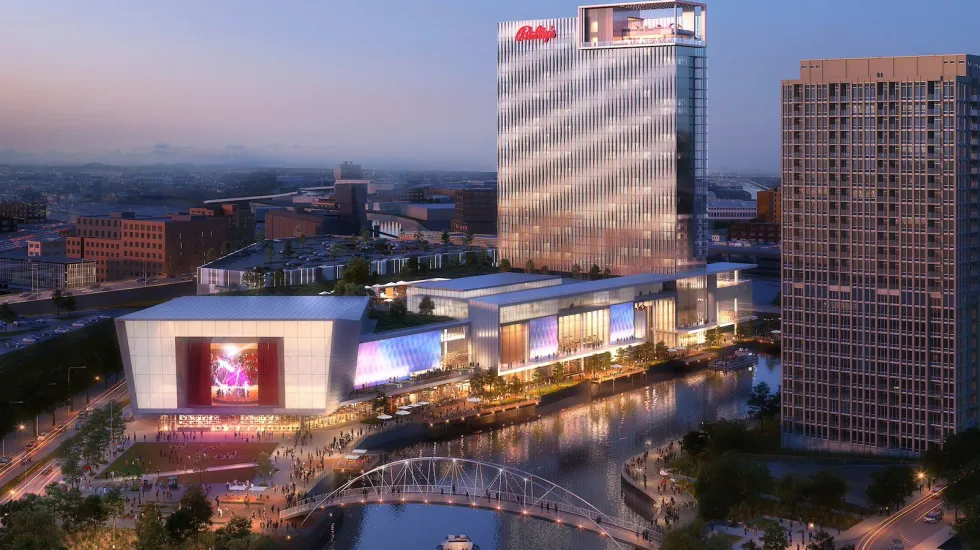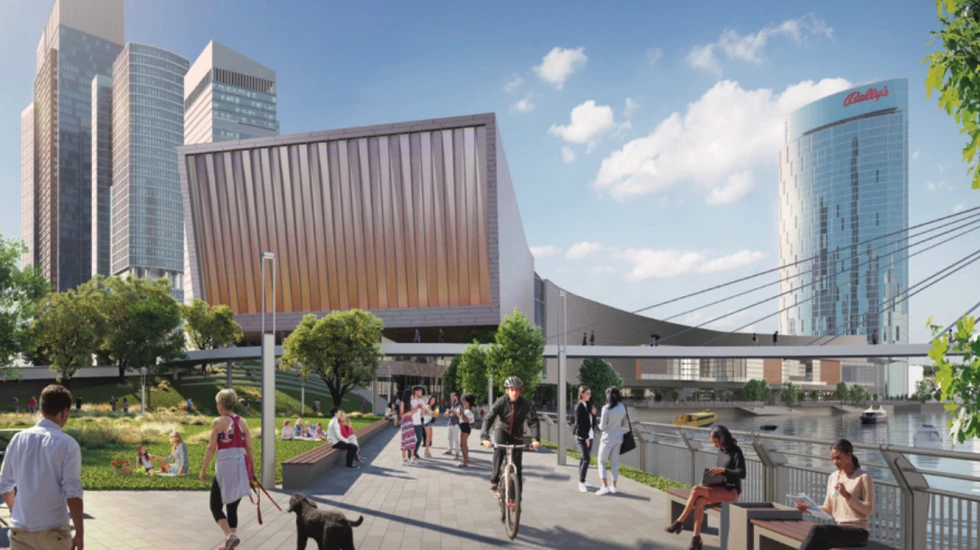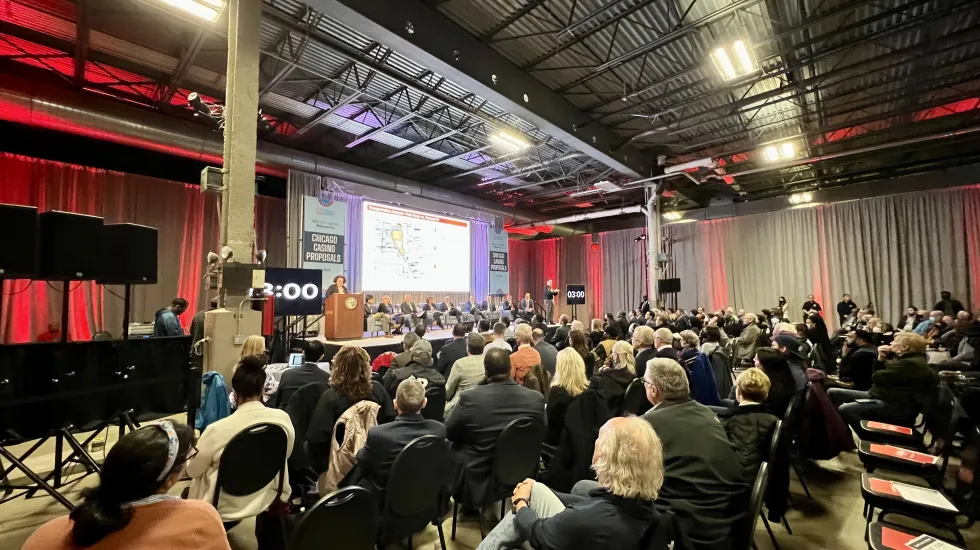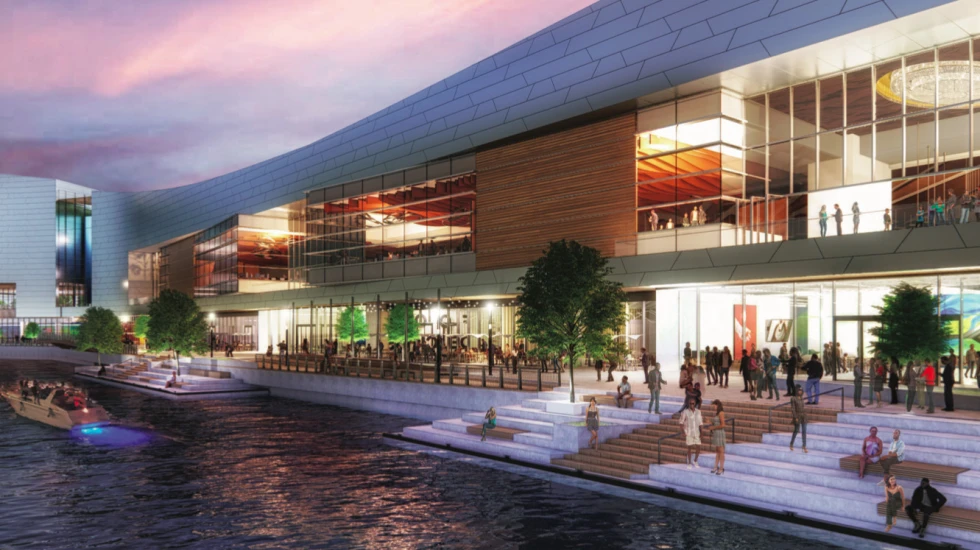
Mayor Lori Lightfoot is preparing to turn over her cards in the Chicago casino game, with all signs pointing to a winning hand for Bally’s Corporation and their River West bid, sources told the Chicago Sun-Times on Tuesday.
The city signaled in a March report that Bally’s proposal for the Chicago Tribune printing plant site at Chicago Avenue and Halsted Street was the frontrunner over two other finalists for the casino. An official decision could come Thursday.
The publicly traded Rhode Island corporation was the only one to offer an upfront payment of $25 million for the license — and was projected as the top revenue generator over a Hard Rock casino proposed across DuSable Lake Shore Drive from Soldier Field, and the so-called “Rivers 78” plan backed by billionaire Neil Bluhm for the South Loop. Those are key considerations for city officials desperate to start pumping casino tax revenue into depleted police and firefighter pension funds.
Also key — as demanded by union leaders and alderpersons at a City Council casino committee meeting last week — is a signed agreement with organized labor groups.
Bally’s was finalizing a labor agreement Tuesday, a source told the Sun-Times. Such a deal would put organized labor behind the Bally’s proposal, political support that could be needed to get it through the City Council.
Representatives for the three casino finalists didn’t have any immediate comment Tuesday on Lightfoot’s looming decision.
It would mark the latest changeup on the casino timeline from her office, which initially promised a choice in the first few months of 2022, then delayed it until “early summer” to allow a series of public meetings for potential neighbors to air concerns over crime and traffic.

The decision, when announced, sets the stage for what could be a contentious fight in the City Council, which must ratify the casino site before it goes to the Illinois Gaming Board, which has final say on issuing a casino license.
The battle lines are drawn. City Council members in wards adjacent to the Bally’s site — Ald. Brian Hopkins (2nd) and Ald. Brendan Reilly (42nd) — oppose the casino, and have many residents who agree. On the other side is Ald. Walter Burnett (27th). The Bally’s site is in his ward, and he supports it because the alternative is a pre-election property tax increase.
First and foremost, Hopkins questioned Lightfoot’s decision to go around the City Council committee she packed with her handpicked leadership team and supposedly empowered to make all decisions related to a Chicago casino.
That committee, led by Zoning Committee Chairman Tom Tunney (44th), has met only once and has not weighed in on a specific site.
“It would look awful to empower this entire committee, and then not have that be the first step in terms of the final decision before the mayor says, ‘This is what I want to do.’ I mean — the whole thing is just a charade,” Hopkins said.
Hopkins acknowledged Burnett could “give the mayor cover” by “playing the aldermanic prerogative card.” He could say, as Hopkins put it, “I want it in my ward, even though some of the surrounding wards don’t.”
If that happens, Hopkins said he and Reilly would have no choice but to “lobby our colleagues against this proposal.”

He pointed to the chief criticism Bally’s has faced from its competitors: that the company acquired most of its 14 casinos in other states well after they were launched, and has never built a casino in a major market from the ground up.
“To pick a team with no experience constructing large, multi-use projects is folly. This is not a project for beginners,” Hopkins said.
“They’re going to make mistakes. They’re going to do things that a more experienced team wouldn’t do. It’s going to delay the project. It’s going to cause all sorts of inconvenience to the neighborhood. We will probably wind up with something that is defective in some ways. … Quickest to market is a promise that is unlikely to be kept by this inexperienced team that don’t seem to know what they’re doing.”
Hopkins said area residents almost universally oppose the site because of its “logistical challenges,” referring to the traffic issues that hundreds of River North residents bemoaned during Bally’s public meeting last month. Bally’s chairman Soo Kim has argued their plan, with a series of traffic signal upgrades, would actually help reduce congestion.

Hopkins said those traffic nightmares simply “cannot be overcome” due to natural barriers: the river, the railroad tracks and “two elevated structures that form the intersection” of Chicago and Halsted.
“It’s already a traffic bottleneck under the best of conditions. To add a casino at that location — it just won’t work,” he said.
“Same arguments that ultimately doomed the proposed soccer stadium on the Lincoln Yards site. You just look at the natural flow of ingress and egress for large crowds and there’s simply no way to accommodate it in an efficient manner. It can’t be done. Traffic engineers are not miracle workers.”
Hopkins conceded Lightfoot “has a pretty good track record of cobbling together 26 votes when she needs to.”
But, he added: “In this case, the stakes are too high to allow it to be rammed through for political reasons.”
Reilly told the Sun-Times in a text message: “I haven’t heard anything about a Thursday announcement and have spoken with a number of my colleagues already this morning & they haven’t either. Several are committee chairmen.”
During the one and only casino committee meeting last week, Reilly maintained reaction to the Bally’s development at the Chicago Tribune printing plant, 777 W. Chicago Ave., has been “overwhelmingly negative.” The River North Residents Association, strong opponents of the Bally’s site, said more than 2,300 have responded to an online survey, with 80.5% against that location.
“Perhaps if the city had engaged with the aldermen on potential sites and helped gear that conversation and guide it with the potential developers and operators, that might have produced less acrimony and more up-front consensus on how best to locate this casino,” Reilly said.
Samir Mayekar, deputy mayor for neighborhood and economic development, argued then that “what COVID has done to the real estate market and what it takes to get financed” argued against “pushing one site.”
Lightfoot has posed a question to those who don’t want a casino in their backyard: Would you prefer a pre-election property tax increase to bail out police and fire pensions?
For Ald. Walter Burnett (27th), whose ward includes the Bally’s site, the answer is an emphatic “No.” Which is why he is willing to swallow the inconvenience.
”I would rather vote for a casino than vote for a property tax increase. Definitely. If we can come up with an alternative to raise money, then I’m cool. We don’t have to have it. But I don’t know where we’re gonna get $200 million a year, along with the $25 million to $75 million up front,” Burnett said.
“None of us coming into an election want to put that much burden on any more people. Everybody’s taxes went up last year because of the re-assessments. I’ve got people telling me they’re trying to unload their property. They can’t afford to keep ’em no more. I’m feeling for these folks. In my high-end neighborhoods and in my West Side neighborhoods they’re hurting. I can’t be a part of hurting everybody for a few people.”
Burnett was completely unsympathetic to Hopkins’ claim about “unsolvable” traffic congestion at the Chicago-Halsted intersection.
“I live right by the United Center. I deal with traffic every day. Every event I’ve been living with traffic. We’re still alive. We survive. We make it. It’s not that big of a deal. People adjust,” Burnett said.
“I know people got a lot of fears. But those of us who live around Cubs park, live around all of these places where traffic is, people adapt. And more and more people aren’t even driving. More and more people are taking public transportation.”

After decades of futility and missed casino opportunities in Springfield, “this thing is a big deal for the city on a mega-front,” Burnett said.
“It’s bigger than me. Bigger than the neighborhood. It’s for the city. It’s for the future.”
Burnett was asked to weigh the odds that the City Council could reject Lightfoot’s decision on the casino site.
“Anything is possible. … It’s hard for me to gauge today. A lot of things that used to be [off limits] in the past have been acceptable today. It’s like a whole different world for me. I can’t predict nothing. … As we get closer to the election, it’s getting more and more every man for himself,” he said.
“As far as I’m concerned, this is the mayor’s game. This is her thing. It didn’t come from the aldermen. It’s not aldermanic prerogative. This is coming from the top down to us.”
A source said Bally’s is close to an agreement with the Chicago Federation of Labor to have the casino complex use union workers. That would include the restaurants and hotel planned for the site.
When the council’s casino committee met April 25, Robert Reiter J., CFL president, testified alderpersons should not endorse any casino plan until the operator commits to a unionized work force. Reiter Jr. said union representation would assure a “living wage” for casino staff.
“What good is millions in revenue if it keeps thousands of marginalized workers below the poverty line? It doesn’t make sense,” Reiter told the committee. His federation represents 300 unions.
Reiter said then that only one of the three casino applicants had expressed interest in a labor agreement. He did not identify the company, but sources said later it was Bally’s.
Christopher Jewett, vice president of corporate development at Bally’s, was not immediately available for comment. He has previously issued a statement asserting: “We have strong relationships with labor unions at properties we own across the country and expect Chicago will be no different.”
Brian Israel, president of the River North residents’ group, said Lightfoot is making unilateral decisions about the casino site without letting alderpersons weigh in. He said the group plans to meet with Hopkins and Reilly next week and insisted opponents are offering more than simplistic “not in my back yard” arguments.
“This is not NIMBY-style opposition,” he said. “We support positive development in our community. I don’t want this thing in anybody’s back yard.”







